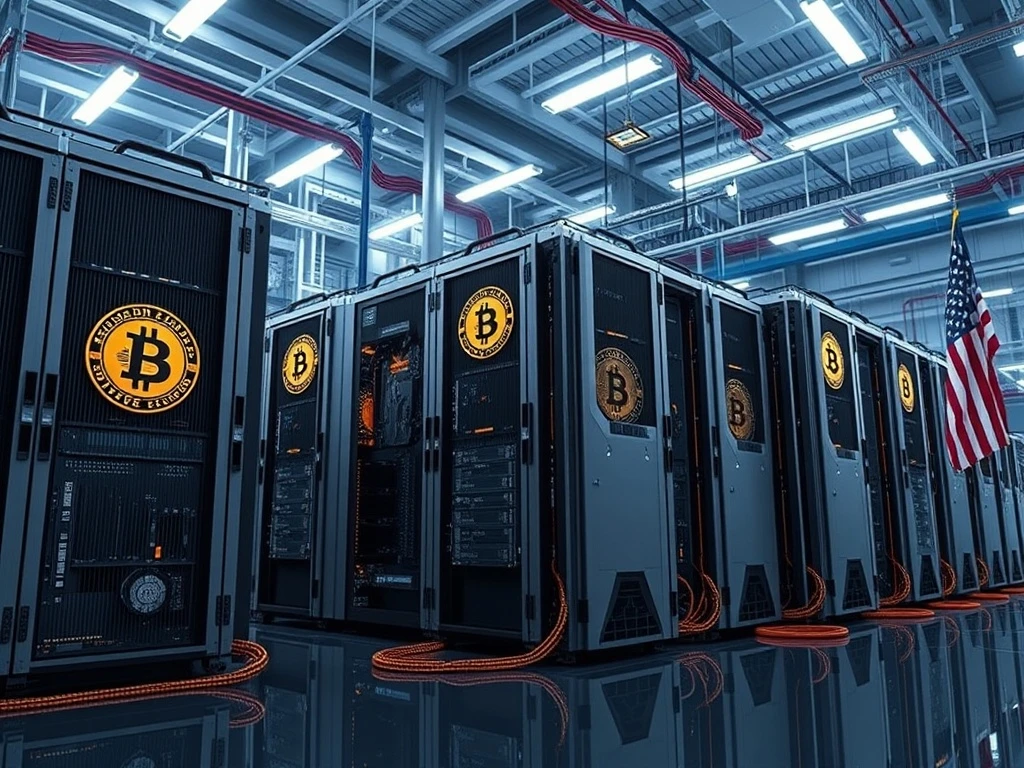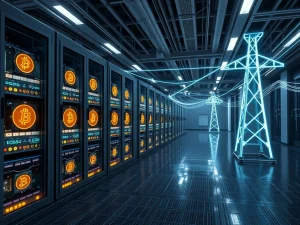Bitcoin Mining Sees Strategic Boost: Trump-Backed Firm Orders 16K Bitmain ASICs Amid Trade Challenges

The landscape of cryptocurrency mining constantly shifts. A significant development recently emerged in the Bitcoin mining sector. American Bitcoin, a company with ties to former US President Donald Trump’s family, has made a substantial purchase. This firm exercised an option to acquire nearly 17,280 application-specific integrated circuits (ASICs) from Bitmain. These powerful machines are crucial hardware for crypto mining operations. This major deal unfolds amid ongoing global trade tensions, particularly the Trump trade war policies impacting imports.
American Bitcoin Secures Massive Bitmain ASICs Order
Earlier this month, American Bitcoin finalized a significant hardware acquisition. The company purchased a fleet of 16,299 Antminer U3S21EXPH units. These machines are from Bitmain, a leading manufacturer in the industry. This substantial order represents a computing power of 14.02 exahashes per second (EH/s). The total cost for this advanced equipment reached approximately $314 million, according to reports from TheMinerMag. Importantly, the deal included an exemption from potential price increases. These increases could stem from the Trump administration’s sweeping trade tariffs and import duties, which target Chinese-manufactured mining hardware. Consequently, this arrangement provides a strategic advantage to American Bitcoin.
Bitmain’s Strategic Move Amidst Trade Pressures
In direct response to tariff pressures, Bitmain announced a pivotal decision. The company plans to open its first ASIC production facility in the United States. This facility is expected to be operational by the end of 2025. Furthermore, Bitmain intends to establish a new headquarters. Potential locations include Florida or Texas. This move signifies a major shift in the global supply chain for mining hardware. It directly addresses the economic calculations of both miners and hardware producers. Trade tariffs and other macroeconomic factors have indeed created considerable strain. The entire Bitcoin mining supply chain must now adapt to a shifting financial landscape.
Trade Tariffs Reshape the US Bitcoin Mining Industry
The imposition of tariffs has compelled major mining hardware manufacturers to reconsider their global strategies. Many now contemplate relocating a portion of their operations to the United States. This relocation aims to circumvent import taxes imposed on their products. The global market for Bitcoin mining hardware is highly concentrated. Over 99% of all such hardware comes from just three manufacturers: Bitmain, MicroBT, and Canaan. This information comes from a study published by the University of Cambridge. Bitmain stands as the largest mining hardware manufacturing company worldwide. It commands a significant market share, approximately 82% of the total.
Mining hardware market share is divided between three large manufacturers. Source: University of Cambridge
The Trump administration’s strategy uses trade tariffs to bring manufacturing back to the US. This approach has garnered mixed reactions. Critics argue that these policies could be inflationary in the long term. They also suggest these measures might ultimately backfire. Jaran Mellerud, CEO of BTC mining company Hashlabs, voiced concerns. He believes price increases from tariffs could significantly reduce demand from US Bitcoin mining companies. Consequently, ASIC manufacturers might face excess inventory. They would then export this inventory to other countries at lower prices. This scenario could push mining activities back to other nations. It would place US Bitcoin mining companies at a competitive disadvantage. This outcome would directly contradict the administration’s goal of reshoring the crypto industry within the United States.
The Future of ASIC Manufacturers and Global Competition
The current economic climate forces ASIC manufacturers to innovate and adapt. Relocating production facilities is one key strategy. This helps them navigate complex trade regulations. However, this shift introduces new challenges. Increased production costs in the US could make American-made hardware more expensive globally. This might hinder export opportunities. Moreover, the long-term impact on global hash rate distribution remains uncertain. If US miners face higher equipment costs, their profitability could decrease. This could encourage miners to establish operations in regions with lower overheads. Jack Dorsey’s Block, for instance, focuses on extending the lifecycle of Bitcoin mining rigs. This initiative aims to reduce replacement costs for miners. Such efforts become even more critical under tariff pressures.
The broader implications of these trade policies extend beyond hardware costs. They influence global investment in the mining sector. Nations are increasingly aware of Bitcoin’s strategic importance. Some experts, like Samson Mow, suggest the US risks being ‘front run’ on Bitcoin reserves by other nations. This highlights a geopolitical dimension to the ongoing developments. The decisions made by companies like American Bitcoin and Bitmain, coupled with governmental policies, will shape the future of decentralized finance. The evolving dynamics underscore the complexity of integrating a global, digital asset industry with traditional national economic policies.









